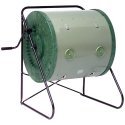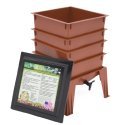What is the Difference Between Compost and Soil?
Are soil and compost different? Compost and soil are very different. Soil can take in some cases, up to 200 years to finally be produced. While compost is the process of making humus (earth or soil), soil itself is broken down over larger periods of time. Usually once humus is fully composted, through the composting process, it can be added to the soil enriching its already powerful role in nature.
The ecosystem in which we live is unique. It is a complete and perfect system that has withstood the tests of time and developed the laws of nature. No human law can compare to the greatness and beauty that Mother Nature has sculpted through time, in this law, the cycles between life and rebirth are constants. Composting humanities organic waste into humus is a way of humanity working WITH the laws of Nature.
Soil is an integral part of the ecosystem. An entire world of life and rebirth can be found deep under the confines of the earth. For some reason along the course of human evolution, we began to use the realm of soil in ways that were not in accordance to the laws of nature herself. Soil is in fact the accumulation of organic materials that have been broken down completely to produce resources for basic plant growth. Soil is not an easily replaceable resource either. Some studies have shown that to scuff your shoes up in the mountains in a pine grove, could take some 200 years to replace the kicked soil in question. Trees falling over, rotting, and finally becoming reintegrated with the top soil, is a process that could take that long? Then what is the point of composting?
Composting is in fact the process that leads up to the development of humus, a word meaning earth or soil in Latin. Composting should be done in such a manner that it NEVER comes in contact with soil. If a compost pile is being used, it should at the very least be fully layered underneath by some kind of mulch to protect the compost from the soil and vice-versa.
Mulch is any material that can be used as a cover to protect soil from weeds, insects, pest and such things, it can be organic or inorganic, but when dealing with soil and compost, it is always less energy consumption in the end to use only organic mulches. In fact, energy consumption can be measured in kilos of soil. For example, how much petroleum did the truck consume to haul that black plastic tarp used as mulch (Polyethylene), from the factory to the local hardware store? How much did the buyer use to haul it home? How much was used in producing it? How much was used in building the truck that hauled it? How much was used in all and total that into square acres of land that would have been used to retain all that oil? How much does all that land weigh? How many years did it take to produce that oil? For inorganic mulches, and pretty much anything else, energy consumption can be calculated in terms of soil… Why not just use organic mulch? The energy consumption is obviously FAR lower when calculating in terms of soil?
If organic mulch is used, then one day, obviously, soil will be obtained, so no real harm can come to the soil below it. If compost comes in contact with soil and its carrying some kind of dangerous substance such as pathogens or toxic chemicals like gasoline, diesel fuel, oil, grease, jet fuel, wood preservatives, insecticides, herbicides, even TNT and other explosives, these things could potentially seep into the deeper layers of soil until finally reaching an underground stream or just poisoning the whole local regions potentially clean soil. However, if properly kept out of contact from soil, the composting process can break down the vial substances cited above into simple and safe organic molecules. In such an intense example of composting as this one, perhaps a layer of inorganic mulch would be more appropriate?
In the end, what makes compost into soil is careful use of its process. By using compost in an energy efficient way, rich and powerful humus can be added to soil, in a very ethical fashion. Soil may take a long time to produce, but through compost, renewal can be achieved safely and peacefully in accordance to the laws of nature. If the laws of nature are followed and the path of least resistance held true, then the trash known as organic wastes can become a blessing, reusable and efficiently put to ethical use.





